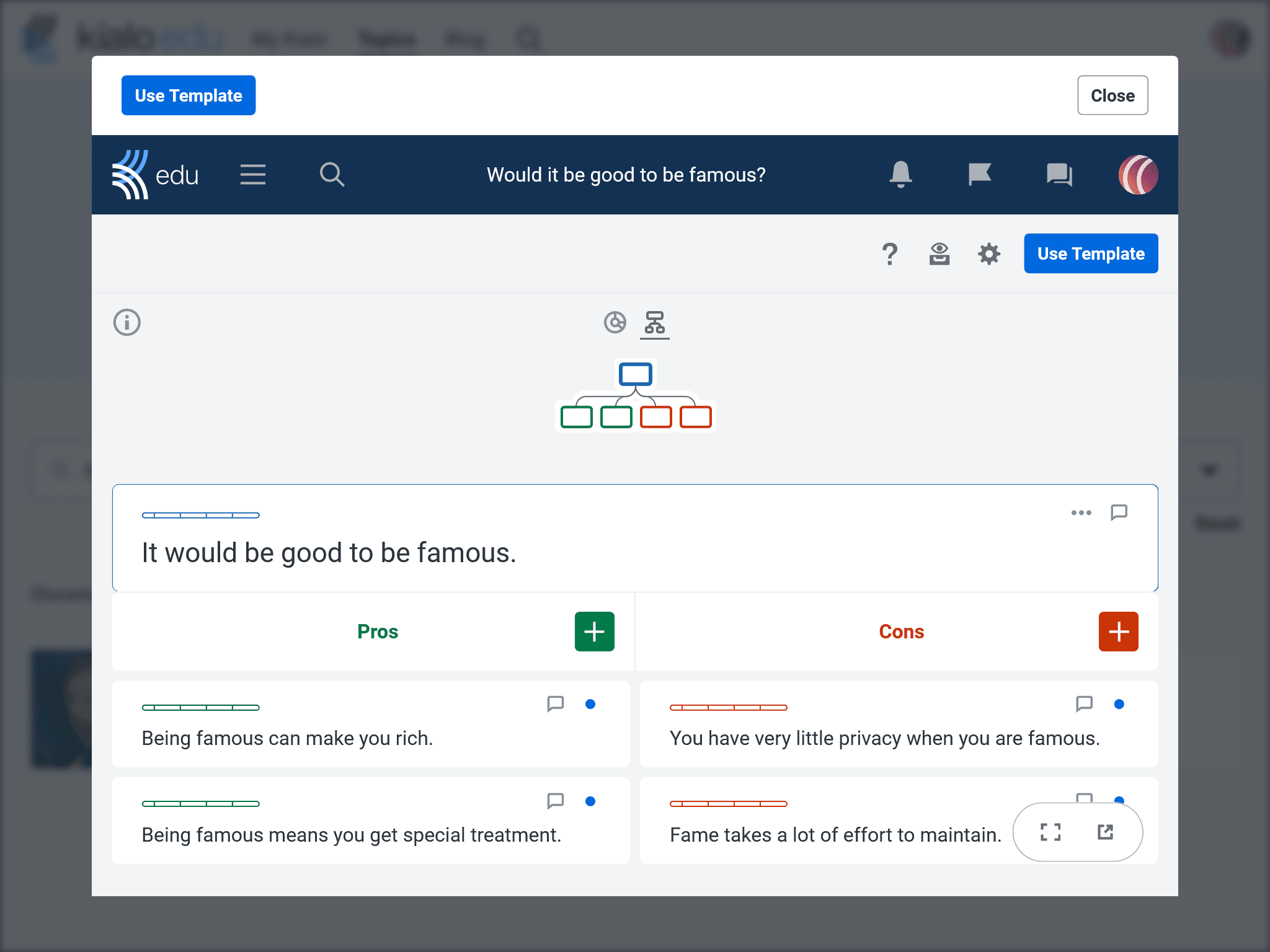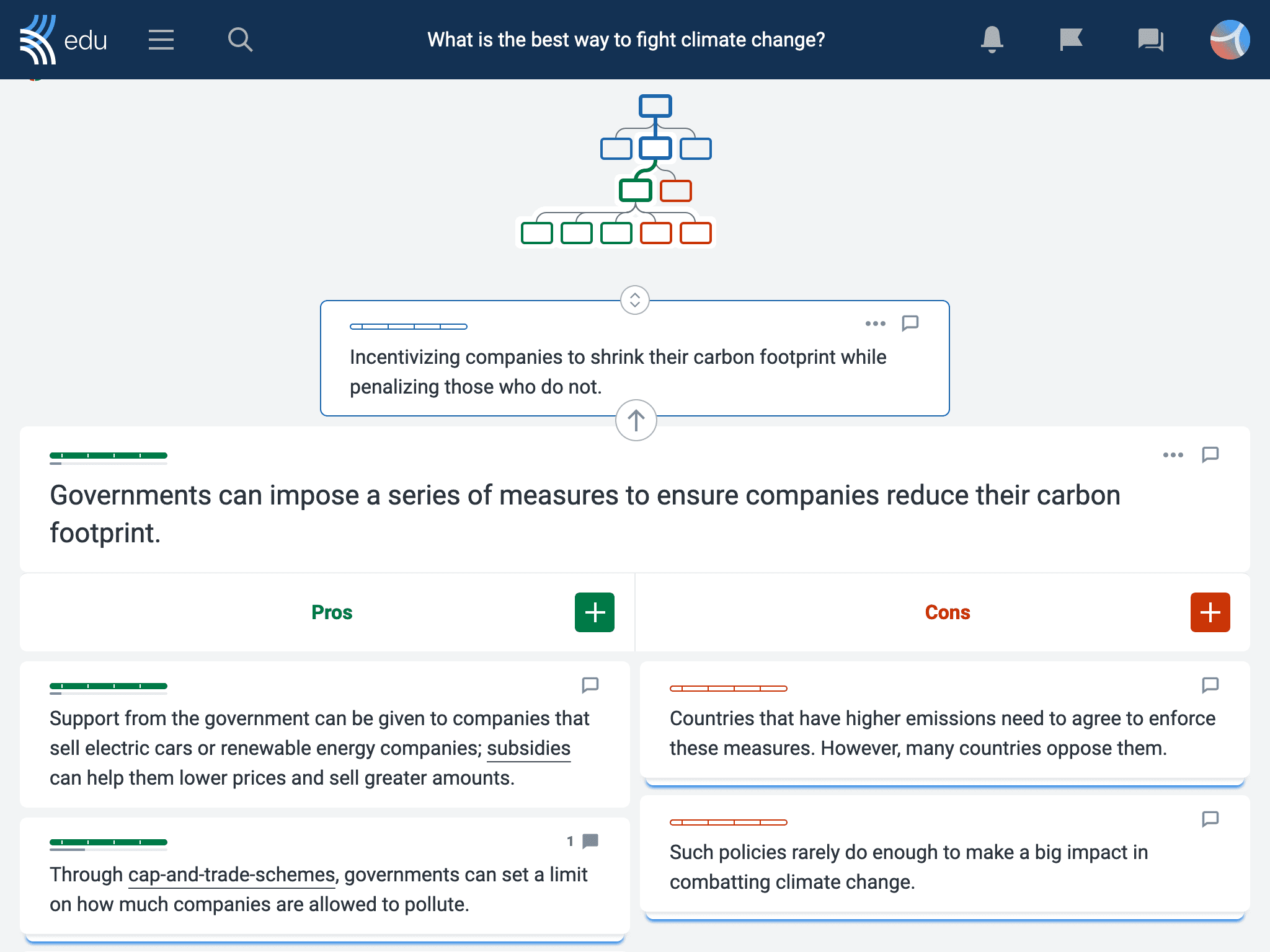The benefits of class discussions don’t need to end when students leave the classroom! With technology in the classroom becoming the norm, online discussion boards allow students to profit from rich discussions anywhere they can access them.
So, let’s explore discussion board assignment examples and discover how Kialo Edu can enhance your online discussion board assignments.
What are the advantages of discussion boards?
Discussion boards are online spaces where students can delve deeper into learning through both synchronous and asynchronous assignments. Not only does this active learning method humanize online learning by providing a space for teachers and students to interact, but it also offers opportunities for students to develop critical thinking and problem-solving skills.
Moreover, educators can set discussion board assignments that promote independent learning strategies, such as self-motivation and time management, or collaborative skills including communication and empathy.
Discussion boards are also inclusive, helping introverted students to participate more confidently than in face-to-face discussions, meaning educators can assess learning more accurately.
Getting students started with discussion boards assignments
Try these examples of discussion board assignments to introduce them to your students!
Using discussion boards to build positive relationships
Get the ball rolling with an engaging low-stakes activity such as Two Truths and a Lie. Students and teachers can discover more about each other, and the information students reveal may help you better personalize their learning.
Alternatively, create a shared story on the online discussion board. Provide the first line, and ask each student in turn to continue the story. Use this to examine collective responsibility for the success of the discussion board, as the final outcome is dependent on everyone’s contributions.
How can Kialo Edu support this?
Take advantage of Kialo Edu’s argument mapping structure as part of the discussion board! Students can share views and consider multiple perspectives on a topic by adding pros and cons under top-level claims, whilst educators can offer guidance with timely feedback.

To get started, try an icebreaker discussion. Discussions on the pros and cons of fame or whether it’s ever okay to lie are sure to motivate your students to get involved!
Practicing research skills with discussion board assignments

Standard research tasks often require all students to research the same information on the same topic. No wonder students sometimes lack engagement! Instead, try one of our discussion board research strategies.
Pizza Research
In this tasty activity, give each student or group a different “slice” of the topic to research. Each “slice” can then be combined on the discussion board to make a complete “pizza,” or topic overview!
As a bonus, allowing students to add contributions through different media sources will challenge them to use technology innovatively and can further enhance engagement.
How can Kialo Edu support this?
Kialo Edu has a range of discussion topics suitable for Pizza Research. For example, in Religious Studies, students can investigate whether Christianity, Islam, and Judaism are compatible with democracy, whilst in Science, students can explore the pros and cons of space tourism.
Each “pizza,” or topic, is pre-prepared with a thesis and at least four “slices”, or starter claims, that can be allocated to different students. Educators can even clone discussions, meaning different groups can work on different versions, before the final “pizzas” are served up in class for review!
Maximizing student participation with discussion board assignments

If you find yourself being “ghosted” by your students on the discussion board, these assignments and strategies can help!
Role-playing activities to encourage discussion participation
To encourage participation, or avoid repetitive contributions, try having smaller groups and assigning roles to students when they work on discussion boards.
For example, students with the role of “Question Editor” must create a discussion question and thesis for their group based on a given topic. To extend the role, they can create multiple questions and justify their final choice.
Try making your discussion board “lurkers” into “Fact Finders” or “Source Searchers.” There will be no more hiding in the shadows, as they must research and write claims and support these with sources of evidence.
For students who dominate discussions, challenge them to evaluate the validity of claims and evidence and offer constructive feedback in the role of “Judge.”
How can Kialo Edu support this?
These roles work effectively in a Kialo Edu discussion too, especially when students are working in teams.
“Question Editors” can use our discussion questions as models to create a range of theses, justifying their final choice, while “Fact Finders” can write starter claims and add pros and cons to the argument tree. “Source Searchers” can compile supporting evidence using the sources list, and “Judges” can evaluate contributions through voting and commenting.
Another take on the role-play strategy is asking students to respond in role. For example, in a discussion about whether governments are doing enough to fight climate change, students can take on the roles of government officials, climate scientists, climate activists, and members of the public, allowing them to consider multiple perspectives. From historical figures to artists and scientists, the role-playing possibilities are endless!
Clarifying and reviewing content to help learning retention
Discussion board assignments that help students clarify content promote metacognition by encouraging students to review learning to identify or question confusing or unclear lesson content.
Discussion boards can then offer both peer and instructor-led support. Other students can clarify the information, deepening both their own understanding and that of their classmates. Or, educators can review these points and either address misconceptions immediately or plan for further coverage in lessons.
This strategy is particularly useful for students who are afraid to ask for clarification in class, as the discussion board can often feel like a safer space in which to ask questions. Sometimes, even just reading the contributions of others may give students the help they need.
How can Kialo Edu support this?
The versatility of Kialo discussions means they can be used with whole classes, small groups, or individual students to record contributions in synchronous or asynchronous discussions that map out the main points of a lesson.

Students can then access the class’s completed argument maps as part of a discussion board assignment, and vote to rate their mastery on each point. Educators can immediately identify target areas and address these, or other students can offer peer support on the discussion board.
We hope these discussion board assignments lead to dynamic student discussions! Let us know your discussion board successes on our social media platforms or at feedback@kialo-edu.com.
Love using Kialo Edu with students? We’ve got a whole host of activity ideas with Kialo Edu that can further students’ critical thinking skills through class discussion!

